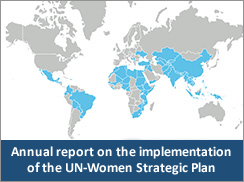Bureau of the UN-Women Executive Board
The Executive Board is the governance structure for UN-Women’s operational activities and provides operational policy guidance to UN-Women. The Board consists of 41 Member States elected by the Economic and Social Council members for a term of three years based on equitable geographical distribution, across regions.
It is a key principle of the United Nations that for all bodies that have fewer members than the 193 UN Member States, membership is allocated through equitable representation among geographical regions. Member States determine the allocation of these seats. All Member States of the United Nations can however participate in all the sessions of the Executive Board including in the negotiations of the Executive Board decisions.
UN-Women Board consists of 10 from African States; 10 from Asian States; 4 from Eastern European States; 6 from Latin American and Caribbean States; 5 from Western Europe and Other States; and 6 from top contributing countries.
Executive Board’s term
Each year, the Economic and Social Council elects members to the Board from among the United Nations Member States. To ensure continuity of experience, only a certain number of new members are elected in any given year. Usually, each member serves a three-year term. The Western European and Others Group has established a rotation schedule for its members under which some States do not serve a full three-year term.
Executive Board’s Bureau elections
The officers of the Executive Board constitute the Bureau and are elected by the Member States of the Executive Board at its first regular session of each year (held in January) from among the membership for that year. The Executive Board calendar matches the calendar year and runs from 1 January to 31 December.
The five officers — the President and four Vice-Presidents — represent the five regional groups, with the presidency rotating among groups every year. For example, the members of the Executive Board were elected by the United Nations Economic and Social Council (ECOSOC) in 2018. In 2019, the Presidency of the Board rotated into the Latin America and the Caribbean Region, and the Executive Board elected the Ambassador of Trinidad and Tobago as President. The four Vice-Presidents elected by the Member States are Australia, Hungary, Kenya and Yemen.
- President: H.E. Ms. Pennelope Althea Beckles, Ambassador and Permanent Representative of the Republic of Trinidad and Tobago to the United Nations
- Vice President: Ms. Natalie Cohen, Counsellor, Permanent Mission of Australia to the United Nations
- Vice President: H.E. Ms. Koki Muli Grignon, Ambassador and Deputy Permanent Representative of Kenya to the United Nations
- Vice President: Mr. Marwan Ali Noman Al-Dobhany, Counsellor and Deputy Permanent Representative of the Republic of Yemen to the United Nations
- Vice President: H.E. Mrs. Katalin Annamária Bogyay, Ambassador and Permanent Representative of Hungary to the United Nations
Former members of the Bureau of the Executive Board: 2018, 2017, 2016, 2015, 2014, 2013, 2012, 2011


